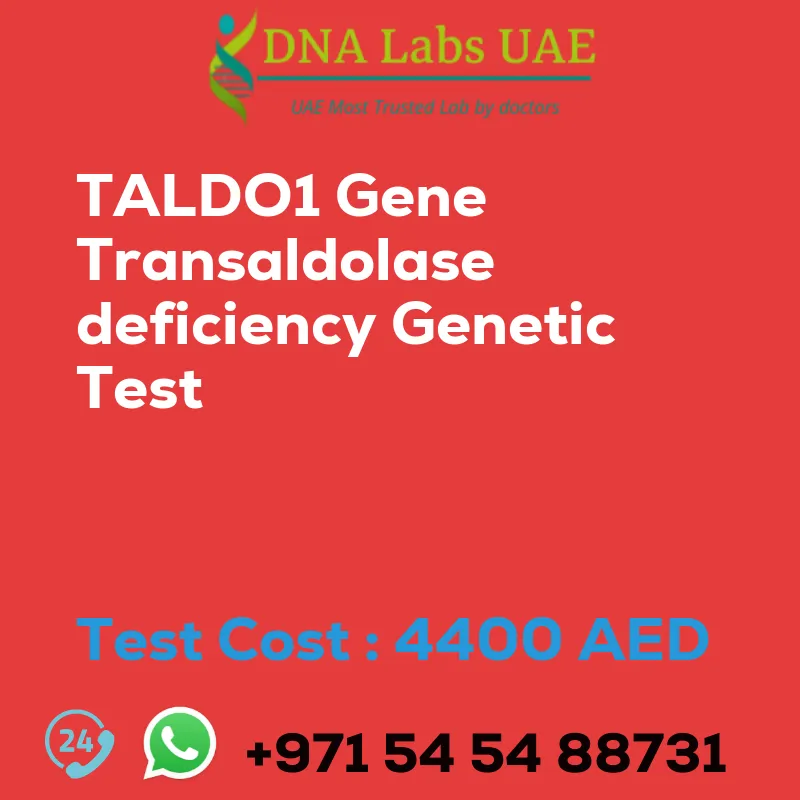TALDO1 Gene Transaldolase Deficiency Genetic Test
At DNA Labs UAE, we offer the TALDO1 Gene Transaldolase Deficiency Genetic Test to help diagnose and understand this rare autosomal recessive disorder. This test analyzes the TALDO1 gene, which is responsible for encoding the transaldolase enzyme involved in the pentose phosphate pathway (PPP).
Test Components and Price
The TALDO1 Gene Transaldolase Deficiency Genetic Test is priced at 4400.0 AED. The test can be conducted using blood, extracted DNA, or one drop of blood on an FTA card.
Report Delivery and Method
After conducting the test, the report will be delivered within 3 to 4 weeks. The test utilizes NGS (Next-Generation Sequencing) technology, which allows for the analysis of multiple genes simultaneously.
Test Type and Doctor
The TALDO1 Gene Transaldolase Deficiency Genetic Test falls under the category of metabolic disorders. It is recommended to consult with a general physician who specializes in genetics.
Test Department and Pre Test Information
The TALDO1 Gene Transaldolase Deficiency Genetic Test is conducted in our Genetics department. Before the test, it is important to provide the clinical history of the patient and undergo a genetic counseling session to draw a pedigree chart of family members affected by Transaldolase deficiency.
Understanding Transaldolase Deficiency
Transaldolase deficiency is a rare genetic disorder caused by mutations in the TALDO1 gene. This condition impairs the activity of the transaldolase enzyme, leading to disruptions in the PPP and the accumulation of toxic metabolites.
NGS Genetic Testing for Transaldolase Deficiency
NGS genetic testing is a high-throughput method used to detect genetic variations, including point mutations, insertions, deletions, and rearrangements. By sequencing the TALDO1 gene, this test can identify any pathogenic variants responsible for transaldolase deficiency.
Diagnosis and Genetic Counseling
The TALDO1 Gene Transaldolase Deficiency Genetic Test can help confirm a diagnosis and provide genetic counseling for affected individuals and their families. Understanding the specific genetic mutations causing transaldolase deficiency can also contribute to the development of targeted therapies in the future.
For more information about the TALDO1 Gene Transaldolase Deficiency Genetic Test or to schedule an appointment, please contact DNA Labs UAE.
| Test Name | TALDO1 Gene Transaldolase deficiency Genetic Test |
|---|---|
| Components | |
| Price | 4400.0 AED |
| Sample Condition | Blood or Extracted DNA or One drop Blood on FTA Card |
| Report Delivery | 3 to 4 Weeks |
| Method | NGS Technology |
| Test type | Metabolic Disorders |
| Doctor | General Physician |
| Test Department: | Genetics |
| Pre Test Information | Clinical History of Patient who is going for TALDO1 Gene Transaldolase deficiency NGS Genetic DNA Test A Genetic Counselling session to draw a pedigree chart of family members affected with Transaldolase deficiency |
| Test Details |
The TALDO1 gene is responsible for encoding the enzyme transaldolase, which plays a crucial role in the pentose phosphate pathway (PPP). This pathway is involved in the production of ribose-5-phosphate, a precursor for the synthesis of nucleotides and other important molecules. Transaldolase deficiency is a rare autosomal recessive disorder caused by mutations in the TALDO1 gene. This genetic condition impairs the activity of the transaldolase enzyme, leading to a disruption in the PPP and a buildup of toxic metabolites. NGS (Next-Generation Sequencing) genetic testing is a method used to analyze multiple genes simultaneously. It allows for the detection of genetic variations, including point mutations, insertions, deletions, and rearrangements, in a high-throughput manner. NGS genetic testing for transaldolase deficiency involves sequencing the TALDO1 gene to identify any pathogenic variants that may be responsible for the condition. This can help in confirming a diagnosis and providing genetic counseling for affected individuals and their families. By identifying the specific genetic mutations causing transaldolase deficiency, NGS testing can also contribute to understanding the underlying mechanisms of the disorder and potentially guide the development of targeted therapies in the future. |








